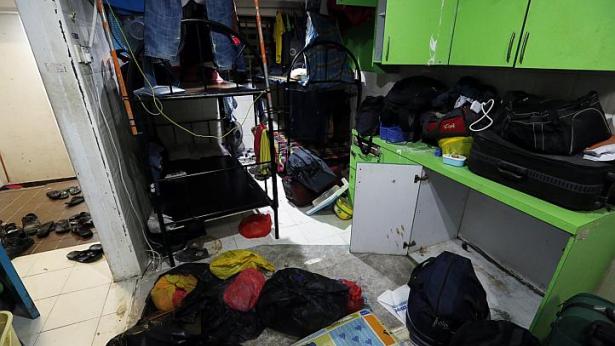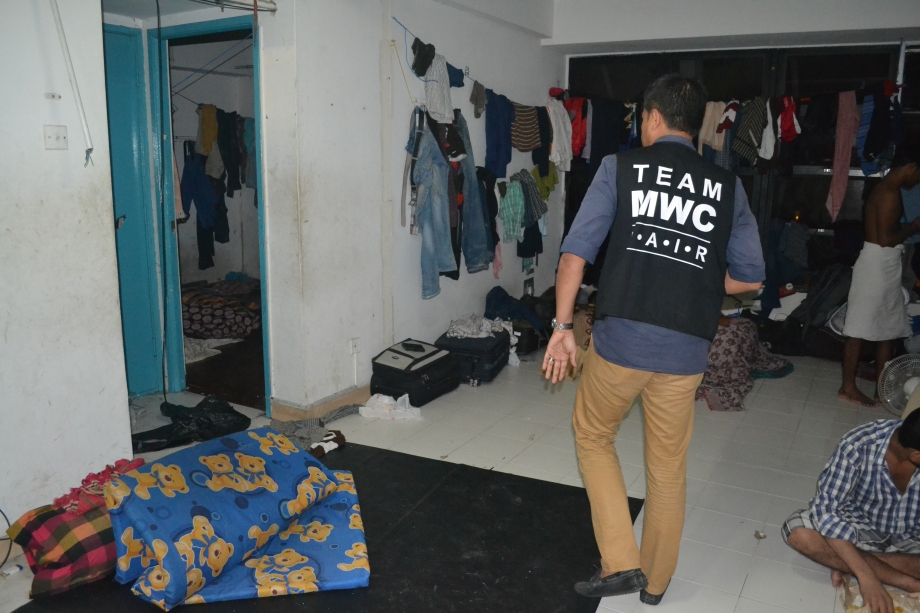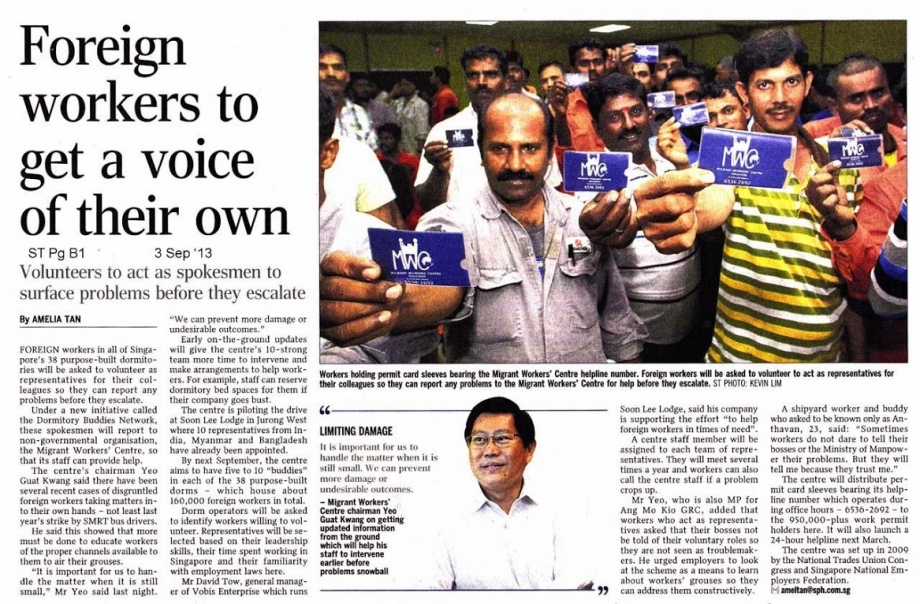Most Singaporeans should be familiar with the storyline of the 1984 television drama serial The Awakening (雾锁南洋) and probably can even hymn its famous opening title. With our beloved Veteran Actor Huang Wen Yong as the main lead, the series featured the hardship experienced by our first generation of Chinese immigrants, who arrived to a relatively undeveloped island and how they slogged to lay the foundation for present day Singapore. Some of the plight experienced by our ancestors are in some way similar to that of our current migrant workers in Singapore. Don’t believe me? Let’s take a look at some of these issues.
1. They Feel Cheated
Just as how our ancestors in China believed the exaggerated claims that Nanyang (one of the old names for Singapore) was a golden land of opportunity where anyone can strike it rich, the recruitment firms in countries such as India, Bangladesh etc have been overselling the job prospect to our migrant workers.
With the promise of a brighter future through employment in Singapore, some of these workers paid an exorbitant amount of money under the laws and legal systems of their own countries. It is only when they reached Singapore then they realised that recovering the investment through earning low wages and enduring high standards of living in Singapore will take a couple of years. But it is already too late by then, they have already set foot onto our Little Red Dot.
2. They Don’t Get Paid As Promised
There is an urgent need to offer wage protection for these migrant workers
There were 2,500 cases (60% of which were salary claims) in 2012, and 3,500 cases in 2013 (65% of which were salary claims). Migrant Workers Centre (MWC) shared that errant employers would find lots of creative ways to not pay their workers. For example, some will have the worker sign the pay slip, but leave the amount blank and fill in a lesser amount after or deduct their pay due to petty issues at work.
With low education and close to zero knowledge on Singapore’s employment act, many of these migrant workers are unaware of their employment rights. They are unable to fend for themselves especially when working on foreign lands. Unscrupulous employers cash in on this vulnerability to delay their salary, deduct their wages on the grounds of mistakes committed by the workers, keep mum when it comes to overtime pay and increase their own profit margins.
3. Horrible Living Conditions
If you think that slums in Singapore only exist during the period in ‘The Awakening’, think again.
To lower accommodation costs, many hard-hearted employers house their migrant workers within dormitories that squeeze an average 30 to 40 beds in a room. This is not a rare sight for folks who work closely with migrant workers. SMRT drivers who recently went on strike and complained about having to share their rooms with 7 other workers should feel slightly better by comparison!
But their fury helped to bring to light the living conditions of migrant workers, despite many years of non-governmental organisations and activists raising these same concerns.
4. They Are Stuck With Their Employers
Even if these migrant workers are aware of their employment rights, many migrant workers do not have the courage to whistle blow their employers. They run the risk of losing their livelihood should their appeal fail.
Put yourself in their shoes, will you have the guts to do it?
They Chose To Come Here Right?
No doubt these low skilled migrant workers chose to come to work in Singapore on their own accord, Singapore should still treat them with basic workers rights and be seen internationally as a fair and just country. They are not our slaves and they work hard for their livelihood.
As a friend rightfully pointed out – Singapore is progressing at a breakneck speed. If not for these migrant workers, who will do all the laborious tasks that Singaporeans shun from? All Singaporeans wants cushy, air-conditioned office 9 to 5 jobs, who will construct buildings and build roads? These migrant workers form the real bedrock of our nation’s development.
So although they are only here for a transient period, we should treat them with dignity and respect.
How Can Singapore Help
Crafting labour policies for low-skilled migrant workers is treading on thin wire. With Singaporeans’ strong resentment towards migrant workers, doing more for these non-enfranchised citizens nor fully participating members of society runs the risk of further complicating the question of how far their welfare should be considered if it comes at the expense of citizens.
Although international bilateral solutions from both Singapore and the origin country is the key driver to alleviate the situation, it is not likely that countries such as India and Bangladesh would come up with such comprehensive legislation to protect their citizens. They are likely to place a higher priority on creating meaningful employment for their overwhelming working population than to fight for their labour rights.
Thankfully, there are other complementary measures that can be pursued on our end to reduce the problem.
1. Dispel Unrealistic Expectations
Ministry of Manpower (MOM) has agreed earlier this year to include key employment terms within work permit holders’ contracts to prevent agents from using unfair or deceptive clauses to cheat migrant workers. These key employment terms will be implemented in 2016. Tripartite guidelines in 2015.
This would be coupled with more employment education for migrant workers to better understand their rights before they leave their home countries. Migrant Workers’ Centre (MWC) has recently partnered MOM to produce a pre-departure video to educate them on unfair and illegal agency practices, social and cultural norms, employment rights and help channels in their respective native language.
Hopefully, this will better equip them with a greater chance of recovering inflated charges they have paid under the laws and legal systems of their own countries.
2. Implement Electronic Payment Of Salaries
Migrant workers who are hesitant to complain that they weren’t paid are afraid that they will be sent home after the case is resolved, and they will not have the opportunity to carry on working in Singapore. It is difficult for them to look for an alternative job as their employer can “take revenge” and send them back before they can find another employer in order to retain their work passes.
Migrant workers also need to work in Singapore for around one and a half years before they are able to pay off their agent fees (could be in the thousands of Singapore dollars). If they are sent home before that, they face a large debt that burdens their entire family. If they were to come back to Singapore again, they have to pay exorbitant agent fees a second time round.
This difficult situation prompted many NGOs including MWC’s Chairman Yeo Guat Kwang to campaign for electronic payment of salaries and urge MOM to prosecute errant employers who don’t pay their workers on time.
3. Better Accommodations For Workers
There have been significant improvements on migrant workers accommodations. They now enjoy more purpose-built dormitories, more serious enforcement of the rules, and employers have been taken to task by the Ministry of Manpower (MOM) for failing to provide adequate housing for their workers.
However, as MWC pointed out, dormitories with less than 1000 beds (which tend to cut corners) are not covered by MOM’s new dormitory regulations, and is pushing for MOM to also look into regulating smaller dormitories.
4. Employment & Placement Flexibility
MOM should look into migrant workers being allowed to change employers for the following situation:
– Consent of employer
– End of contract worker
– If there is a legitimate complaint
Personally, I find that the power is still very much on the employers but having the option in place is a lot better than nothing.
You Can Play A Part Too
As normal citizens, there is a limited on how much we can help these migrant workers. But the least you can do to make their lives better is to treat them with dignity and appreciation them for their hard work.
Giving them a comforting smile is totally free and you may just make their day!











